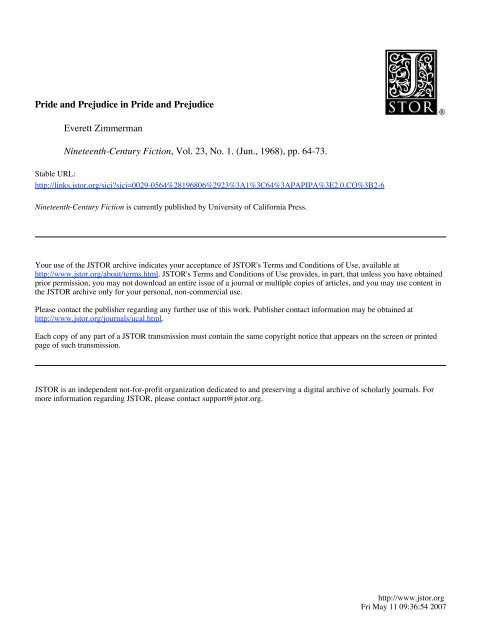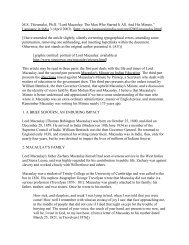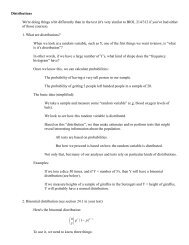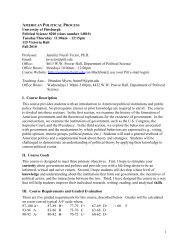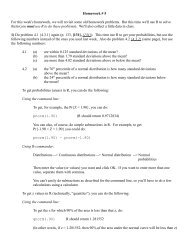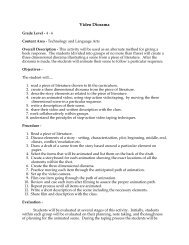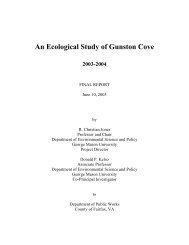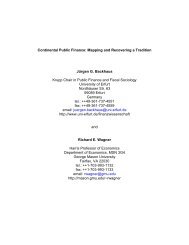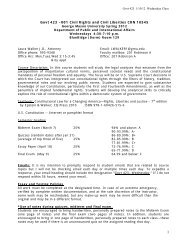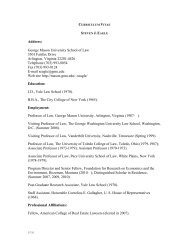"Pride and Prejudice in Pride and Prejudice" by Everett Zimmerman
"Pride and Prejudice in Pride and Prejudice" by Everett Zimmerman
"Pride and Prejudice in Pride and Prejudice" by Everett Zimmerman
You also want an ePaper? Increase the reach of your titles
YUMPU automatically turns print PDFs into web optimized ePapers that Google loves.
<strong>Pride</strong> <strong>and</strong> <strong>Prejudice</strong> <strong>in</strong> <strong>Pride</strong> <strong>and</strong> <strong>Prejudice</strong><br />
<strong>Everett</strong> <strong>Zimmerman</strong><br />
N<strong>in</strong>eteenth-Century Fiction, Vol. 23, No. 1. (Jun., 1968), pp. 64-73.<br />
Stable URL:<br />
http://l<strong>in</strong>ks.jstor.org/sici?sici=0029-0564%28196806%2923%3A1%3C64%3APAPIPA%3E2.0.CO%3B2-6<br />
N<strong>in</strong>eteenth-Century Fiction is currently published <strong>by</strong> University of California Press.<br />
Your use of the JSTOR archive <strong>in</strong>dicates your acceptance of JSTOR's Terms <strong>and</strong> Conditions of Use, available at<br />
http://www.jstor.org/about/terms.html. JSTOR's Terms <strong>and</strong> Conditions of Use provides, <strong>in</strong> part, that unless you have obta<strong>in</strong>ed<br />
prior permission, you may not download an entire issue of a journal or multiple copies of articles, <strong>and</strong> you may use content <strong>in</strong><br />
the JSTOR archive only for your personal, non-commercial use.<br />
Please contact the publisher regard<strong>in</strong>g any further use of this work. Publisher contact <strong>in</strong>formation may be obta<strong>in</strong>ed at<br />
http://www.jstor.org/journals/ucal.html.<br />
Each copy of any part of a JSTOR transmission must conta<strong>in</strong> the same copyright notice that appears on the screen or pr<strong>in</strong>ted<br />
page of such transmission.<br />
JSTOR is an <strong>in</strong>dependent not-for-profit organization dedicated to <strong>and</strong> preserv<strong>in</strong>g a digital archive of scholarly journals. For<br />
more <strong>in</strong>formation regard<strong>in</strong>g JSTOR, please contact support@jstor.org.<br />
http://www.jstor.org<br />
Fri May 11 09:36:54 2007
<strong>Pride</strong> <strong>and</strong> Preiudice<br />
<strong>in</strong> <strong>Pride</strong> <strong>and</strong> Prejndice<br />
E V E R E T T Z I M M E R M A N<br />
APPROACHING JANE AUSTEN'S WORK chronologically, one<br />
is struck <strong>by</strong> her analogous methods of entitl<strong>in</strong>g pride-<strong>and</strong> <strong>Prejudice</strong><br />
<strong>and</strong> Sense <strong>and</strong> Sensibility, her preced<strong>in</strong>g novel. The title<br />
Sense <strong>and</strong> Sensibility def<strong>in</strong>es what is clearly the central moral conflict<br />
of that novel, but the simple <strong>and</strong> repeated opposition of the<br />
titular qualities is one of the marks of Jane Austen's artistic immaturity.<br />
The relationship between the title <strong>Pride</strong> <strong>and</strong> <strong>Prejudice</strong><br />
<strong>and</strong> the conflicts <strong>in</strong> that novel is not so immediately apparent as <strong>in</strong><br />
Sense <strong>and</strong> Sensibility, but the skill shown <strong>in</strong> us<strong>in</strong>g the titular<br />
qualities to keep the moral framework of the novel clear while<br />
present<strong>in</strong>g a novelistic world of great complexity is one of the<br />
triumphs of Jane Austen's develop<strong>in</strong>g technique.<br />
Although the mean<strong>in</strong>g of the title has attracted considerable<br />
comment, the qualities of pride <strong>and</strong> prejudice have been <strong>in</strong>terpreted<br />
so narrowly that the full significance of the title has been<br />
obscured. Indeed, R. C. Fox, who regards the title as, primarily,<br />
Jane Austen's concession to the popularity of alliterative <strong>and</strong> antithetical<br />
titles, has warned us not to be "misled <strong>by</strong> <strong>in</strong>vest<strong>in</strong>g the<br />
title with more significance than is warranted." l The usual <strong>in</strong>terpretation<br />
is that the title is a reference to Darcy's pride, which<br />
causes him to reject Elizabeth <strong>and</strong> her family, <strong>and</strong> Elizabeth's<br />
result<strong>in</strong>g prejudice, which is re<strong>in</strong>forced <strong>by</strong> Wickham's false story<br />
about D a r ~ y But . ~ Fox suggests that the morally significant conflict<br />
is between pride <strong>and</strong> vanity, not between pride <strong>and</strong> prejudice.<br />
This dist<strong>in</strong>ction between pride <strong>and</strong> vanity is, however, based on<br />
<strong>Everett</strong> <strong>Zimmerman</strong> is an assistant professor of English, College of South Jersey,<br />
Rutgers University, Camden, New Jersey.<br />
l Robert C. Fox <strong>in</strong> "Elizabeth Bennet: <strong>Prejudice</strong> or Vanity?" NCF, XVII (September,<br />
1962), 185.<br />
a For example, see Mark Schorer's <strong>in</strong>troduction to <strong>Pride</strong> <strong>and</strong> <strong>Prejudice</strong> (Houghton<br />
Miffl<strong>in</strong> Co., 1956), pp. xii-xiii.<br />
[641
<strong>Pride</strong> <strong>and</strong> <strong>Prejudice</strong><br />
the words of Mary Bennet, a character who is satirized, as D. J.<br />
Dooley notes, for mak<strong>in</strong>g imperceptive comment^.^ And Dooley<br />
also shows that the usual mean<strong>in</strong>gs of pride <strong>and</strong> prejudice do ex-<br />
pla<strong>in</strong> a substantial number of the fail<strong>in</strong>gs of Elizabeth <strong>and</strong> Darcy.<br />
Nevertheless, despite his demonstration of the weaknesses of Fox's<br />
arguments, Dooley does not entirely dispel all uneas<strong>in</strong>ess about<br />
the title. Should it not, <strong>in</strong> the context of the novel, acquire richer<br />
<strong>and</strong> more pert<strong>in</strong>ent mean<strong>in</strong>gs than the merely literal ones that<br />
critics ord<strong>in</strong>arily suggest? Even <strong>in</strong> the less complex Sense <strong>and</strong> Sensibility,<br />
the terms of the title, although already hav<strong>in</strong>g complicated<br />
mean<strong>in</strong>gs <strong>in</strong> Jane Austen's time, are developed <strong>and</strong> modified so<br />
that they take on dist<strong>in</strong>ctive mean<strong>in</strong>gs relevant to the moral eval-<br />
uations of the novel. B. C. Southam correctly suggests a parallel<br />
between the novels:<br />
In the revision of El<strong>in</strong>or <strong>and</strong> Marianne the contraries sense <strong>and</strong> sensi-<br />
bility may have been extended to f<strong>in</strong>d expression throughout the book;<br />
so too <strong>in</strong> the re-work<strong>in</strong>g of First Impressions the pride of Darcy <strong>and</strong> the<br />
prejudice of Elizabeth may have been more subtly presented, as weak-<br />
nesses common to both, <strong>and</strong> framed <strong>in</strong> a schematic relationship among<br />
the other characters.4<br />
When we follow Southam's h<strong>in</strong>t <strong>and</strong> exam<strong>in</strong>e the schematic ar-<br />
rangement of the characters, we see that <strong>in</strong> their exhibitions of<br />
pride <strong>and</strong> prejudice these characters modify our underst<strong>and</strong><strong>in</strong>g<br />
of the titular qualities <strong>in</strong> such a way as to show us clearly the rela-<br />
tionship of pride <strong>and</strong> prejudice to the moral issues of the novel.6<br />
The mean<strong>in</strong>gs that "pride" <strong>and</strong> "prejudice" acquire are related<br />
to the central theme of all of Jane Austen's novels-the limitations<br />
of human vision. As developed <strong>in</strong> the book, the qualities of<br />
pride <strong>and</strong> prejudice conta<strong>in</strong> both an opposition <strong>and</strong> an aff<strong>in</strong>ity.<br />
<strong>Pride</strong> is a detachment from other human be<strong>in</strong>gs <strong>in</strong> which the self<br />
is not seen as <strong>in</strong>volved with others but as superior to them, as un-<br />
concerned. However, characters <strong>in</strong> Jane Austen's works cannot<br />
8D. J. Dooley <strong>in</strong> "<strong>Pride</strong>, <strong>Prejudice</strong>, <strong>and</strong> Vanity <strong>in</strong> Elizabeth Bennet," NCF, XX<br />
(September, 1965), 187.<br />
Jane Austen's Literary Manuscripts (New York, 1964), p. 60.<br />
6A. Walton Litz <strong>in</strong> Jane Austen: A Study of Her Artistic Development (New<br />
York, 1965), p. 105, implies that pride <strong>and</strong> prejudice are organiz<strong>in</strong>g factors <strong>in</strong> the<br />
novel, <strong>and</strong> Mark Schorer <strong>in</strong> his <strong>in</strong>troduction, p. xvii, notes group<strong>in</strong>gs of characters<br />
accord<strong>in</strong>g to the categories of pride <strong>and</strong> prejudice. Neither of these critics, however,<br />
expla<strong>in</strong>s precisely how <strong>in</strong> these categories the entire moral framework of the novel<br />
is suggested.<br />
65
66 N<strong>in</strong>eteenth-Century Fiction<br />
rema<strong>in</strong> aloof: with or without <strong>in</strong>tention they are drawn <strong>in</strong>to the<br />
the affairs of others. Failure to recognize this <strong>in</strong>volvement is a<br />
form of moral <strong>and</strong> <strong>in</strong>tellectual obtuseness, <strong>and</strong> a constant resist-<br />
ance to this <strong>in</strong>volvement results <strong>in</strong> a renunciation of responsibility<br />
or happ<strong>in</strong>ess. <strong>Prejudice</strong> is the opposite of pride: the self is com-<br />
pletely <strong>in</strong>volved with others, <strong>and</strong> everyth<strong>in</strong>g is <strong>in</strong>terpreted as it<br />
affects the self. Although the <strong>in</strong>evitable <strong>in</strong>volvement between<br />
others <strong>and</strong> the self is acknowledged, judgment is entirely dis-<br />
torted. Both qualities, pride <strong>and</strong> prejudice, result <strong>in</strong> a severe<br />
limitation of human vision <strong>and</strong> are essentially selfish <strong>in</strong> that they<br />
start from an egoistic attitude; one either severs oneself from<br />
others or limits one's concern for them to narrow self-<strong>in</strong>terest.<br />
<strong>Pride</strong> <strong>and</strong> <strong>Prejudice</strong> opens with a conversation between Mr.<br />
<strong>and</strong> Mrs. Bennet, two characters who consistently emphasize the<br />
salient qualities of the fail<strong>in</strong>gs implied <strong>by</strong> the title; Mr. Bennet<br />
exhibits the detachment of pride <strong>and</strong> Mrs. Bennet the total <strong>in</strong>-<br />
volvement of prejudice. Mr. Bennet's characteristic speech is<br />
ironic, <strong>and</strong> the pervasiveness of the irony reflects his refusal to<br />
commit himself to any action. His credo, as he formulates it, is,<br />
"For what do we live, but to make sport for our neighbors, <strong>and</strong><br />
laugh at them <strong>in</strong> our turn." Mrs. Bennet's speech, <strong>in</strong> contrast<br />
to Mr. Bennet's, is totally devoid of irony <strong>and</strong> humor. She is en-<br />
tirely committed to gett<strong>in</strong>g her daughter; married <strong>and</strong> <strong>in</strong>terprets<br />
everyth<strong>in</strong>g <strong>in</strong> the light of that over-rid<strong>in</strong>g concern, not be<strong>in</strong>g<br />
"backward to credit what was for the advantage of her family. . ."<br />
(378).<br />
These two characters <strong>in</strong> their brilliant open<strong>in</strong>g scene establish<br />
themselves as moral poles around which many of the m<strong>in</strong>or char-<br />
acters cluster. Mr. Coll<strong>in</strong>s <strong>and</strong> Mary Bennet .provide amusement<br />
for Mr. Bennet, but <strong>in</strong> their unsympathiz<strong>in</strong>g detachment from<br />
others' feel<strong>in</strong>gs they resemble him. Lydia, as Marv<strong>in</strong> Mudrick<br />
notes, is a younger Mrs. Bennet,? <strong>and</strong> Jane Bennet allows her<br />
judgment to be distorted <strong>by</strong> her <strong>in</strong>volvements <strong>and</strong> desires, just as<br />
Lydia <strong>and</strong> Mrs. Bennet do. F<strong>in</strong>d<strong>in</strong>g it pa<strong>in</strong>ful to see evil <strong>in</strong> the<br />
world, Jane simply refuses to see it. And Lady Cather<strong>in</strong>e treats<br />
human be<strong>in</strong>gs merely as projections of her own desires. All of<br />
e<strong>Pride</strong> <strong>and</strong> <strong>Prejudice</strong>, ed. R. W. Chapman, 3rd ed. (New York, 1932), p. 364. All<br />
subsequent references are to this edition.<br />
Jane Austen: Irony as Defense <strong>and</strong> Discovery (Pr<strong>in</strong>ceton, 1952), p. 99.
<strong>Pride</strong> <strong>and</strong> <strong>Prejudice</strong> 67<br />
these characters re<strong>in</strong>force that opposition of qualities already es-<br />
tablished <strong>by</strong> Mr. <strong>and</strong> Mrs. Bennet.<br />
As these characters illustrate, pride <strong>and</strong> prejudice are qualities<br />
which thwart any moral perspective on events. Mr. Bennet uses<br />
human be<strong>in</strong>gs for amusement. Mary <strong>and</strong> Mr. Coll<strong>in</strong>s, even while<br />
moraliz<strong>in</strong>g on human behavior, are unconcerned about morality:<br />
human actions are for them only materials for mak<strong>in</strong>g platitudes<br />
designed to reveal their own superiority. Mrs. Bennet's <strong>and</strong><br />
Lydia's <strong>in</strong>terest <strong>in</strong> marriage has displaced any other perspective<br />
they might have, <strong>in</strong>clud<strong>in</strong>g a moral one. Jane Bennet's cont<strong>in</strong>ual<br />
emotional <strong>in</strong>volvement with others makes her blunt all moral<br />
dist<strong>in</strong>ctions, <strong>and</strong> Lady Cather<strong>in</strong>e regards noth<strong>in</strong>g but her own<br />
wishes. These static characters provide the background for the<br />
maneuver<strong>in</strong>gs of the central characters, Elizabeth <strong>and</strong> Darcy, who,<br />
although touched <strong>by</strong> pride <strong>and</strong> prejudice, overcome the limita-<br />
tions imposed <strong>by</strong> these qualities <strong>and</strong> become equal to the moral<br />
challenges presented to them.<br />
An exam<strong>in</strong>ation of the novel's narration <strong>and</strong> dialogue reveals<br />
clearly the function of Mr. <strong>and</strong> Mrs. Bennet <strong>and</strong> the related m<strong>in</strong>or<br />
charactem8 Because any accurate judgment of the actions of Darcy<br />
<strong>and</strong> Elizabeth is made quite difficult <strong>in</strong> the earlier parts of the<br />
book, these m<strong>in</strong>or characters are needed to alert the reader to the<br />
moral issues.<br />
The character from whose po<strong>in</strong>t of view much of the action is<br />
seen is Elizabeth. But authorial verification of Elizabeth's judg-<br />
ments, even on occasions when she is not obviously misled, has<br />
an ambiguous quality <strong>in</strong> the earlier parts of the book. For example,<br />
although Elizabeth's judgments of B<strong>in</strong>gley's sister start out<br />
as personal op<strong>in</strong>ions, they are f<strong>in</strong>ally presented as authoritative<br />
<strong>and</strong> not limited <strong>by</strong> Elizabeth's po<strong>in</strong>t of view. However, the sup-<br />
port of Elizabeth's judgment rests on the comment that she had<br />
"a judgment too unassailed <strong>by</strong> any attention to herself" (15)<br />
to be misled, a qualification which suggests that her astuteness is<br />
temporary.<br />
8Reuben Brower <strong>in</strong> "Light <strong>and</strong> Bright <strong>and</strong> Sparkl<strong>in</strong>g: Irony <strong>and</strong> Fiction <strong>in</strong><br />
<strong>Pride</strong> <strong>and</strong> <strong>Prejudice</strong>," <strong>in</strong> T h e Fields of Light (New York, 1951), pp. 164-181, com-<br />
ments astutely on Jane Austen's technique <strong>and</strong> notes that she uses some of the<br />
characters as "fools" aga<strong>in</strong>st whom the "<strong>in</strong>tricate characters" are measured. He ar-<br />
gues, however, that Mr. <strong>and</strong> Mrs. Bennet's detachment from the develop<strong>in</strong>g action<br />
is an artistic fail<strong>in</strong>g; I argue that their position outside the central action is an im-<br />
portant rhetorical device for establish<strong>in</strong>g the moral framework of the novel.
68 N<strong>in</strong>eteenth-Century Fiction<br />
At times even the commentary presented <strong>by</strong> the narrator is so<br />
abundantly ironical that the authority of any po<strong>in</strong>t of view is<br />
cancelled, as when Wickham's false story of Darcy is spread:<br />
...every body was pleased to th<strong>in</strong>k how much they had always disliked<br />
Mr. Darcy before they had known anyth<strong>in</strong>g of the matter.<br />
Miss Bennet was the only creature who could suppose there might<br />
be any extenuat<strong>in</strong>g circumstances <strong>in</strong> the case, unknown to the society<br />
<strong>in</strong> Hertfordshire; her mild <strong>and</strong> steady c<strong>and</strong>our always pleaded for al-<br />
lowances, <strong>and</strong> urged the possibility of mistakes-but <strong>by</strong> everybody else<br />
Mr. Darcy was condemned as the worst of men (138).<br />
Those who judge Darcy are treated ironically: they are pleased<br />
to censure him. The only person who supports him is Jane Bennet,<br />
but although she is right, she has already been presented as unable<br />
to th<strong>in</strong>k evil of anyone, no matter what the circumstances. The<br />
authorial voice here leads the reader to a position from which<br />
judgment is impossible; only amused spectatorship is possible.<br />
Nevertheless, on occasions like this one, the reader is not entirely<br />
deprived of a moral perspective. Although he is shown the un-<br />
resolvable complexities of the situation, he is constantly made<br />
aware of the crucial moral problems <strong>by</strong> the characters of pride<br />
<strong>and</strong> prejudice.<br />
In the earlier parts of the book, whenever any pressure is built<br />
up lead<strong>in</strong>g to a direct clash or a serious moral choice or judgment,<br />
it tends to be dissipated <strong>in</strong> action, dialogue, or commentary. For<br />
example, Darcy's unwill<strong>in</strong>g attraction to Elizabeth <strong>and</strong> Eliza-<br />
beth's fasc<strong>in</strong>ated but clear dislike of Darcy seem <strong>in</strong>evitably to be<br />
lead<strong>in</strong>g toward a confrontation out of which will come a resolu-<br />
tion. For a time we get clearer than usual <strong>in</strong>sight <strong>in</strong>to Darcy with<br />
the suggestion of an approach<strong>in</strong>g climax, <strong>and</strong> when, on a walk,<br />
Darcy <strong>and</strong> Miss B<strong>in</strong>gley suddenly meet Elizabeth <strong>and</strong> Mrs. Hurst,<br />
Darcy behaves with a politeness revelatory of chang<strong>in</strong>g feel<strong>in</strong>gs.<br />
Elizabeth, however, immediately decl<strong>in</strong>es walk<strong>in</strong>g with them <strong>and</strong><br />
runs "gaily off (53). This <strong>in</strong>cident is characteristic of much of<br />
the early action. Forces do not meet <strong>and</strong> resolve. They constantly<br />
shift <strong>and</strong> dissipate rather than clash.<br />
A conversation between Darcy <strong>and</strong> Elizabeth shortly before<br />
Elizabeth leaves Netherfield illustrates these shift<strong>in</strong>g qualities <strong>in</strong><br />
the early dialogues (57-58). The reader can never accept any<br />
attitude or formulation as def<strong>in</strong>itive. As he has no vantage po<strong>in</strong>t
<strong>Pride</strong> <strong>and</strong> <strong>Prejudice</strong><br />
69<br />
from which to evaluate what is occurr<strong>in</strong>g, he must constantly skip<br />
from attitude to attitude just as the participants do. Elizabeth<br />
asserts her detached attitude, her love of laugh<strong>in</strong>g at others. Darcy<br />
responds seriously <strong>and</strong> morally, po<strong>in</strong>t<strong>in</strong>g out deficiencies <strong>in</strong> Eliza-<br />
beth's attitude: "The wisest <strong>and</strong> best of men, nay, the wisest <strong>and</strong><br />
best of their actions, may be rendered ridiculous <strong>by</strong> a person<br />
whose first object <strong>in</strong> life is a joke" (57). Elizabeth picks up the<br />
moral tone to justify herself, but immediately twists it to an<br />
ironic comment on Darcy's good op<strong>in</strong>ion of himself:<br />
I hope I never ridicule what is wise or good. Follies <strong>and</strong> nonsense,<br />
whims <strong>and</strong> <strong>in</strong>consistencies do divert me, I own, <strong>and</strong> I laugh at them<br />
whenever I can.-But these, I suppose, are precisely what you are with-<br />
out.<br />
When Darcy cont<strong>in</strong>ues <strong>in</strong> his moral tone, Elizabeth attacks more<br />
directly. Then <strong>in</strong> response, Darcy becomes more <strong>and</strong> more pomp-<br />
ously proud of his own deficiencies: "My temper would perhaps<br />
be called resentful.-My good op<strong>in</strong>ion once lost is lost for ever"<br />
(58). Elizabeth at this po<strong>in</strong>t becomes serious, almost <strong>in</strong>dignant:<br />
"That is a fail<strong>in</strong>g <strong>in</strong>deed!" But soon she changes attitude, <strong>and</strong> her<br />
exaggerated charge returns the tone to the earlier witty one, but<br />
without reduc<strong>in</strong>g her opposition to him: "And your defect is a<br />
propensity to hate every body.'' Darcy, suddenly tak<strong>in</strong>g all rancor<br />
out of the opposition, smil<strong>in</strong>gly replies to her, "And yours . . .is<br />
wilfully to misunderst<strong>and</strong> them." In Elizabeth's tone there are the<br />
rapid changes from ironic, to serious, to banter<strong>in</strong>g, <strong>and</strong> <strong>in</strong> Darcy's<br />
from the seriously moral, to the pompous, to startl<strong>in</strong>g good humor.<br />
It is attitude that is significant, <strong>and</strong> the reader who rests on any<br />
one attitude will distort. In fact, one of the examples of Eliza-<br />
beth's own prejudiced distortions is the version of this conversa-<br />
tion which she later gives to Wickham: "I do remember his<br />
boast<strong>in</strong>g one day, at Netherfield, of the implacability of his re-<br />
sentments, of his hav<strong>in</strong>g an unforgiv<strong>in</strong>g temper. His disposition<br />
must be dreadful" (80). But the entire conversation at Nether-<br />
field does not bear Elizabeth out. What she has done is to fix on<br />
one of the attitudes of the conversation; she simplifies the action,<br />
the flux, to a s<strong>in</strong>gle, underst<strong>and</strong>able attitude. Elizabeth's propensi-<br />
ties to subtle distortion are, of course, made more visible <strong>by</strong> their<br />
magnification <strong>in</strong> the conduct of the m<strong>in</strong>or characters.
70 N<strong>in</strong>eteenth-Century Fiction<br />
As the plot develops, avoid<strong>in</strong>g clashes, judgments, <strong>and</strong> resolu-<br />
tions becomes more <strong>and</strong> more difficult. Near the end of Book I1<br />
the theme of the Netherfield conversation reappears, but the<br />
movement of the conversation is quite changed. There is a dis-<br />
cernible direction to it, <strong>and</strong> it leads to a formulation (225-<br />
226). Elizabeth is tell<strong>in</strong>g Jane of her changed op<strong>in</strong>ions of Wick-<br />
ham <strong>and</strong> Darcy. She comments ironically on Jane's characteristic<br />
attempts to excuse both, <strong>and</strong> on her own treatment of Darcy:<br />
And yet I meant to be uncommonly clever <strong>in</strong> tak<strong>in</strong>g so decided a dis-<br />
like to him, without any reason. It is such a spur to one's genius, such<br />
an open<strong>in</strong>g for wit to have a dislike of that k<strong>in</strong>d. One may be cont<strong>in</strong>-<br />
ually abusive without say<strong>in</strong>g anyth<strong>in</strong>g just; but one cannot be always<br />
laugh<strong>in</strong>g at a man without now <strong>and</strong> then stumbl<strong>in</strong>g on someth<strong>in</strong>g witty<br />
(226).<br />
She recognizes here that she has laughed at what is good, despite<br />
what she had previously said to Darcy; however, the recognition<br />
is detached, shorn of any visible feel<strong>in</strong>g. But when Jane asks<br />
specifically about her feel<strong>in</strong>gs when she received Darcy's letter,<br />
Elizabeth replies, "I was uncomfortable enough. I was very un-<br />
comfortable" (226). And <strong>in</strong>stead of retreat<strong>in</strong>g from the moral<br />
evaluation toward which the conversation tends, she states it di-<br />
rectly: "But the misfortune of speak<strong>in</strong>g with bitterness, is a most<br />
natural consequence of the prejudices I had been encourag<strong>in</strong>g"<br />
(226). The conversation probes for <strong>and</strong> f<strong>in</strong>ds an attitude; it does<br />
not, like the earlier ones, kaleidoscopically shift all attitudes.<br />
Jane Austen's technique is functional: it suggests both the com-<br />
plexity of Elizabeth's world <strong>and</strong> her <strong>in</strong>ner moral development.<br />
The reductions of pride <strong>and</strong> prejudice always cause grief, <strong>and</strong><br />
Elizabeth learns to recognize <strong>and</strong> overcome the limitations of hu-<br />
man vision which threaten her happ<strong>in</strong>ess. Early <strong>in</strong> the book her<br />
attitude is frequently the ironic one characteristic of her father.<br />
She shares his appreciation of Mr. Coll<strong>in</strong>s' absurdity; Sir Wil-<br />
liam Lucas's servile behavior to Lady Cather<strong>in</strong>e is "high diver-<br />
sion" to her (159); <strong>and</strong> her division of characters <strong>in</strong>to simple<br />
<strong>and</strong> complex onesg reveals a detached attitude toward human<br />
be<strong>in</strong>gs <strong>and</strong> an avoidance of any moral judgment. In her reactions<br />
toward Darcy, she resembles her mother. Darcy's harsh, although<br />
justified, comments on the Bennet family <strong>in</strong>flame Elizabeth's preju-<br />
See Mudrick's analysis of this division,pp. 94-95.
<strong>Pride</strong> <strong>and</strong> <strong>Prejudice</strong> 7 1<br />
dices <strong>in</strong> favor of her family <strong>and</strong> aga<strong>in</strong>st Darcy. Eventually, how-<br />
ever, she learns to judge accurately while deeply <strong>in</strong>volved; she<br />
learns to avoid the limitations imposed <strong>by</strong> pride <strong>and</strong> prejudice.<br />
The narrative techniques not only mirror the world of the novel,<br />
but also <strong>in</strong>volve the responsive reader <strong>in</strong> that world, forc<strong>in</strong>g him<br />
to adopt, while read<strong>in</strong>g, that degree of flexibility, that withhold<strong>in</strong>g<br />
of judgment when evidence is lack<strong>in</strong>g, which Elizabeth must<br />
adopt.<br />
However, while the rapidly shift<strong>in</strong>g po<strong>in</strong>t of view <strong>and</strong> attitude,<br />
<strong>and</strong> the perplex<strong>in</strong>g narration characteristic of the earlier parts of<br />
the book are describ<strong>in</strong>g, creat<strong>in</strong>g, <strong>and</strong>, <strong>in</strong> a sense, mim<strong>in</strong>g Eliza-<br />
beth's difficulties <strong>in</strong> that part of the book, the reader is not aban-<br />
doned to her po<strong>in</strong>t of view. The obvious moral fail<strong>in</strong>gs of those<br />
static characters who surround Elizabeth <strong>and</strong> Darcy alert the<br />
reader to Elizabeth's fail<strong>in</strong>gs. Although frequently the reader's<br />
vision cannot extend beyond Elizabeth's, <strong>and</strong> he cannot resolve<br />
the difficulties of her situation, he can recognize the distortions<br />
which occur when Elizabeth attempts to resolve these difficulties<br />
<strong>by</strong> adopt<strong>in</strong>g the limited po<strong>in</strong>t of view characteristic of pride <strong>and</strong><br />
prejudice.lO<br />
Later <strong>in</strong> the book as Elizabeth's irresponsible attitudes break<br />
down, dialogue becomes less frequent but more decisive; authorial<br />
summary becomes more frequent <strong>and</strong> reliable; the shift<strong>in</strong>g<br />
of tonal qualities becomes less rapid; <strong>and</strong> Elizabeth's moral atti-<br />
tude emerges with clarity. This emerg<strong>in</strong>g attitude, however, is<br />
one that is based on a recognition of the complexity <strong>and</strong> deceptive-<br />
ness of the world.<br />
Elizabeth's attachment to Darcy results from the clarification<br />
of her vision, not from the modification of her values; consequently,<br />
the view that the novel suggests a blend<strong>in</strong>g of two con-<br />
trast<strong>in</strong>g value systems, two extremes search<strong>in</strong>g for a middle, must<br />
be rejected.ll Early <strong>in</strong> the book Elizabeth is >haracterized as a<br />
woman of sensibility (<strong>in</strong> the late eighteenth-century sense) <strong>and</strong><br />
l0As is implied throughout this discussion, the early dialogues of the novel do<br />
not appear to me to be so decisive as Howard Babb's meticulous analysis <strong>in</strong> Jane<br />
Austen's Novels: The Fabric of Dialogue (Columbus, Ohio, 1962), pp. 113-114, sug-<br />
gests they are. The ambiguity early <strong>in</strong> the book is purposive; it reveals the complexity<br />
of Elizabeth's world.<br />
llFor example, Samuel Kliger's "Jane Austen's <strong>Pride</strong> <strong>and</strong> <strong>Prejudice</strong> <strong>in</strong> the<br />
Eighteenth-Century Mode," U T Q , XVI (July, 1947), 357-370, deals with Darcy <strong>and</strong><br />
Elizabeth as exemplify<strong>in</strong>g the opposition of art <strong>and</strong> nature. As I suggest below,<br />
however, this antithesis is only apparent-Darcy <strong>and</strong> Elizabeth share the same value<br />
system. Elizabeth's opposition to Darcy is based on her misunderst<strong>and</strong><strong>in</strong>g of him.
72 N<strong>in</strong>eteenth-Century Fiction<br />
noth<strong>in</strong>g, <strong>in</strong>clud<strong>in</strong>g her marriage to Darcy, <strong>in</strong>dicates that her values<br />
have been modified. On her visit to Netherfield dur<strong>in</strong>g Jane's<br />
illness, the narrative cont<strong>in</strong>ually po<strong>in</strong>ts out the contrast between<br />
Elizabeth's values <strong>and</strong> those of B<strong>in</strong>gley's sisters. They cont<strong>in</strong>ually<br />
criticize Elizabeth's breaches of decorum, which are committed<br />
out of feel<strong>in</strong>g for Jane, <strong>and</strong> Elizabeth dislikes them for their<br />
coldness (35-36). She is pleased to th<strong>in</strong>k of the marriage of<br />
Jane <strong>and</strong> B<strong>in</strong>gley because it is a marriage of "true affection"<br />
(98) <strong>and</strong> is disgusted <strong>by</strong> B<strong>in</strong>gley's sisters' attempts to have him<br />
marry for reasons of "money, great connections, <strong>and</strong> pride"<br />
(137). She herself refuses to marry Mr. Coll<strong>in</strong>s because her "feel-<br />
<strong>in</strong>gs <strong>in</strong> every respect forbid it" (109).<br />
The crucial episode <strong>in</strong> the transition of Elizabeth's feel<strong>in</strong>gs for<br />
Darcy from respect to love is her visit to Pemberley; she "had<br />
never seen a place for which nature had done more, or where<br />
natural beauty had been so little counteracted <strong>by</strong> an awkward<br />
taste" (245). The entire description implies that there is, as<br />
<strong>in</strong> the novels of sensibility, a close relationship between taste <strong>and</strong><br />
character; <strong>and</strong> Pemberley <strong>by</strong> exemplify<strong>in</strong>g the natural picturesque<br />
(a picturesque which <strong>in</strong>terferes as little as possible with nature)<br />
reveals a Darcy far different from the one Elizabeth thought she<br />
knew. In Walton Litz's words:<br />
Every evidence of sound aesthetic judgment is converted <strong>by</strong> Elizabeth<br />
<strong>in</strong>to evidence of Darcy's natural amiability, <strong>and</strong> jo<strong>in</strong>ed with the en-<br />
thusiastic testimony of the housekeeper, until Pemberley becomes an<br />
image of his true nature.12<br />
But Elizabeth does not at once reach this conclusion with full<br />
consciousness. The immediate effect of Pemberley is to reduce<br />
her feel<strong>in</strong>gs <strong>and</strong> thoughts to a muddle (265-266). Her oversimplified<br />
view of Darcy's character is disrupted, <strong>and</strong> she must re-<br />
orient herself to a new view of past events, a view undistorted <strong>by</strong><br />
pride <strong>and</strong> prejudice.<br />
Pemberley unmistakably reveals a man whom a woman of sen-<br />
sibility can love, <strong>and</strong> consequently Elizabeth's marriage to Darcy,<br />
after she has sorted out her feel<strong>in</strong>gs, is not a rejection of her values<br />
but a fulfillment of them. Her development is <strong>in</strong> her reject<strong>in</strong>g<br />
both the pride <strong>and</strong> prejudice which caused her moral bl<strong>in</strong>dness<br />
<strong>and</strong> made her deal irresponsibly <strong>and</strong> unjustly with others, not <strong>in</strong><br />
la Jane Austen, p. 104.
<strong>Pride</strong> <strong>and</strong> <strong>Prejudice</strong><br />
her mov<strong>in</strong>g closer to the pride which Darcy acknowledges to be<br />
the cause of his failures (369).<br />
The characters limited <strong>by</strong> pride <strong>and</strong> prejudice cannot under-<br />
st<strong>and</strong> Elizabeth's marriage. Even her staunchest supporters, Mr.<br />
Bennet <strong>and</strong> Jane, are not conv<strong>in</strong>ced <strong>in</strong>itially that there is any deep<br />
feel<strong>in</strong>g <strong>in</strong>volved. But the relationship is one that escapes both the<br />
irresponsibility <strong>and</strong> superficiality of Lydia <strong>and</strong> Wickham, <strong>and</strong><br />
the lovelessness of Mr. Coll<strong>in</strong>s <strong>and</strong> Charlotte. It is not just a lesser<br />
degree of the qualities of both marriages, but someth<strong>in</strong>g entirely<br />
different.<br />
The techniques of <strong>Pride</strong> <strong>and</strong> <strong>Prejudice</strong> allow Elizabeth's sub-<br />
jective <strong>in</strong>ner world to be presented with <strong>in</strong>tensity, while at the<br />
same time her responses are be<strong>in</strong>g evaluated <strong>by</strong> the rubric of the<br />
novel, pride <strong>and</strong> prejudice. The moral concerns of this novel are,<br />
it must be admitted, narrower than those of the later novels, but<br />
this very limitation leads to the happy resolution which tempts<br />
critics of <strong>Pride</strong> <strong>and</strong> <strong>Prejudice</strong> to compare it to a Mozart composi-<br />
tion. Because of the precise focus on the moral issues, the resolu-<br />
tion is tidier than <strong>in</strong> Jane Austen's more somber (although per-<br />
haps more profound) later novels, Mansfield Park, Emma, <strong>and</strong><br />
Persuasion. And <strong>in</strong> the earlier novels, Northanger Abbey <strong>and</strong><br />
Sense <strong>and</strong> Sensibility, the resolutions seem less conv<strong>in</strong>c<strong>in</strong>g than<br />
<strong>in</strong> <strong>Pride</strong> <strong>and</strong> <strong>Prejudice</strong> because the <strong>in</strong>ner worlds of the hero<strong>in</strong>es<br />
are not presented so complexly <strong>and</strong> <strong>in</strong>tensely. <strong>Pride</strong> <strong>and</strong> <strong>Prejudice</strong><br />
is the only one of Jane Austen's novels to present conv<strong>in</strong>c<strong>in</strong>gly<br />
a central character who surmounts the limitations of human vision<br />
<strong>in</strong> all of the areas that the novel has made us care about.<br />
73


